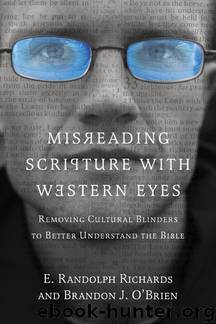Misreading Scripture with Western Eyes by E. Randolph Richards

Author:E. Randolph Richards [Richards, E. Randolph]
Language: eng
Format: epub
Publisher: InterVarsity Press
Published: 2012-07-30T16:00:00+00:00
Honor and Shame in the New Testament
In the same way that God used shame, through Nathan, to bring David to repentance, so also New Testament writers employed honor/shame cultural assumptions to compel Christians to good works. Although Plato predates the New Testament, his influence had not yet shaped Palestinian culture. It was still an honor/shame society.
During what we commonly refer to as the “white throne judgment,” all the misdeeds from our past will be displayed for all to see: “For we must all appear before the judgment seat of Christ, so that each of us may receive what is due us for the things done while in the body, whether good or bad” (2 Cor 5:10).
For us, this is a bummer, but it’s not devastating. I’ve always imagined this as watching a film reel of my foibles (some of them worse than others). Then when that uncomfortable formality concludes, it’s off to heaven for eternity for me. Not so bad, in the grand scheme of things. For Paul’s first-century hearers, though, this news would have brought them to their knees. This judgment is described as a public honor/shame event. (God has the time to judge us all privately and individually, if he so intended.) Paul is applying a shame motivation to get the Corinthians to live worthily of the grace-gift God has given them. The very next line Paul writes is, “Since, then, we know what it is to fear the Lord” (2 Cor 5:11). What is it we are fearing? That the Lord will expose all our sins to the entire community of faith. He is warning them that although they might not currently feel guilty about their sin, there will come a day when they will be publicly shamed for their misdeeds before God and everybody. Paul is trying to “scare them straight.”
During his earthly ministry, Jesus worked within the honor/shame system. In the ancient world, there was only so much honor to go around—it was a limited good. Everyone was scrambling for more. Jesus’ opponents understood this well. Public questions were never for information. If one wanted information, you asked privately, as we often see Jesus’ disciples do (Mt 24:3; Mk 9:28). Likewise, Nicodemus came at night because he didn’t want his question misunderstood. He was looking for answers from Jesus, not honor. But public questions were contests. The winner was determined by the audience, who represented the community. If you silenced your opponent, you gained honor and they lost some. Even though scholars often refer to this as the “honor game,” don’t underestimate its seriousness. As we mentioned above, this is why the Jewish officials killed Jesus. They had been challenging Jesus publicly (Mt 12:1-7, for example), and every time they “lost,” they lost honor. They were tired of it, and they wanted their honor back. In one of these “honor games” with Jesus, the Jewish leaders asked him, “Is it right to pay the imperial tax to Caesar or not?” (Mt 22:17). We often fail to notice the two most important parts of the story, even though Matthew highlighted them.
Download
This site does not store any files on its server. We only index and link to content provided by other sites. Please contact the content providers to delete copyright contents if any and email us, we'll remove relevant links or contents immediately.
| Exegesis & Hermeneutics | New Testament |
| Old Testament |
The Five People You Meet in Heaven by Mitch Albom(3569)
The Secret Power of Speaking God's Word by Joyce Meyer(3218)
Real Sex by Lauren F. Winner(3023)
Name Book, The: Over 10,000 Names--Their Meanings, Origins, and Spiritual Significance by Astoria Dorothy(2987)
The Holy Spirit by Billy Graham(2952)
0041152001443424520 .pdf by Unknown(2845)
How The Mind Works by Steven Pinker(2816)
ESV Study Bible by Crossway(2778)
Ancient Worlds by Michael Scott(2688)
Churchill by Paul Johnson(2584)
The Meaning of the Library by unknow(2571)
The ESV Study Bible by Crossway Bibles(2551)
The Gnostic Gospels by Pagels Elaine(2531)
MOSES THE EGYPTIAN by Jan Assmann(2417)
Jesus by Paul Johnson(2362)
City of Stairs by Robert Jackson Bennett(2354)
The Complete Dead Sea Scrolls in English (7th Edition) (Penguin Classics) by Geza Vermes(2283)
The Nativity by Geza Vermes(2230)
Ancient Near Eastern Thought and the Old Testament by John H. Walton(2226)
